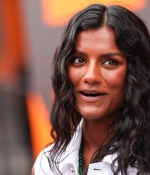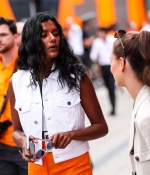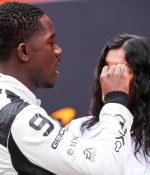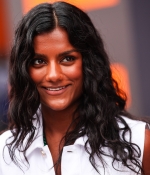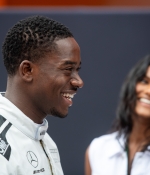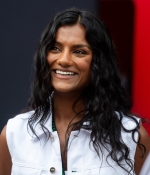The Bridgerton actress discusses working with Johnnie Walker and Diet Paratha on a campaign championing British South Asian creatives.
British-Indian actress Simone Ashley has partnered with South Asian creative community platform Diet Paratha and whisky brand Johnnie Walker for Bold Steps, a campaign dedicated to supporting emerging British South Asian creatives.
A multi-part initiative, it launched with an inspirational and cinematic short film starring Ashley. “The story of our lives often seems to be prewritten, but we can change the narrative and reframe the thinking,” Ashley states in the video, which she creative directed alongside director Kajal. “Taking bold steps towards a direction we were taught to avoid; Walking instead into a world we created for our own lives.” In addition to the video, Johnnie Walker launched a design competition offering to reimagine an exclusive bottle featuring the winner’s artwork.
Now, Johnnie Walker is ready to unveil the limited edition bottle, bringing its Bold Steps campaign to life with illustrator and graphic designer Kushiaania’s bespoke design. The powerful visual was selected by an independent judging panel for its impactful celebration of inner strength and joy. When speaking of the artist, Simone Ashley told Wonderland: “I was really inspired by her work. It’s a really vibrant, powerful expression of feminine strength. She embraced South Asian culture and tradition in a modern gaze, fitting the bottle as well. I’m just really excited for everyone to see the work that she’s done — for her to have her well deserved moment, for it to be on the shelves, and for everyone to see it”.
Kushiannia’s bespoke Johnnie Walker Black Label for Bold Steps will be available to purchase from 1 June, at The Bar. In addition to bringing Kushiaania’s work to life, Johnnie Walker is supporting her creative practice with a £5,000 cash prize, and one-to-one Diet Paratha Family Tree Mentoring by Art Director Manu Pillai. Johnnie Walker will continue to support Diet Paratha with Family Tree Mentorships for five more individuals throughout 2023.
We had the pleasure of speaking with Simone Ashley about what Bold Steps means to her, the collaborative process, and the importance of representation in the creative industries.
Watch the short film campaign…
And now for the interview…
Can you tell me a bit about Bold Steps? What prompted you to work on the campaign and what does it work towards, in your words?
We initially got this concept from Johnnie Walker that came to me and my team, and I was so excited about this idea of them creating this whole concept that encourages inclusivity, especially from the South Asian community. And I mean, it was a no brainer for me immediately, I was like, I definitely want to get involved in this. And I got to know more of the team at Diet Paratha, Anita, and we got to work with an amazing director called Kajal. So we were creating and working together as South Asian women, and that was really special. I’ve never really done anything like that before, for something like this. And that was a big thing of what it was all about to me. It was about South Asian creatives, having their voices amplified and heard, and giving them that space to do so.
And saying all of that, that’s what this Bold Steps movement is about: creating space and creating a platform for this community. Whether it feels like a stepping stone or a big, giant, bold step, it’s something that helps people to feel like they can do it, and that they feel represented. That’s what representation is all about. It’s when younger generations can see themselves in the media and feel like it’s possible for them. And I mean, particularly for our exciting reveal of the bottle. We worked with this incredible South Asian illustrator and designed a bottle for her, and even just meeting her and talking about her experience and what she’s up to… It was just really cool to see moments like that happen. So I think for me, it was just about using my voice and doing what I could with such a cool brand like Johnnie Walker to help amplify the voices of South Asian people.
Between this project and your work on Bridgerton, you’ve been able to champion the South Asian community in a multitude of different ways. What has that combination been like and is there any other part of the industry you’re looking to work in?
I think it’s a journey. I’m learning new things about myself and about the industry and finding a community within that. Every few months I feel like I’m learning something different, and I’m changing. So it’s a journey. I don’t think there’s ever really a point where you’re like, oh, okay, I’ve learned all I need to learn now or I’ve done everything. And I think, in terms of other things I’d like to do, I’m so passionate about music. That’s something I’d love to do even more. Even behind the camera work like photography, I’ve always loved. I guess I’m kind of down for anything. I just want to be able to do everything and have fun with it. I love my job. And if I can do as much as possible then it’s a win for me.
What was the process of being involved in the creative direction of the short film?
I remember coming home from filming and I’d hop on a Zoom with the team from Johnnie Walker and Diet Paratha. And we’d make sure that the concept and the narrative that we were portraying were authentic to me. And within that, that opened up conversations between us where it was like, “Oh, this is something that I experienced.” And everyone would be like, “Oh, it was the same for me” or, you know, a similar kind of thing. And that, to me, was quite a beautiful thing to happen in a workspace, where everyone felt like there was common cause between us, and then to create something that was really beneficial for people to see. I also love fashion. And I love that whole side of it, and music, as I said, so I was very grateful to be given the space to give my suggestions of what I think, for the campaign.
How has the response to the film and the campaign been?
Yeah, I’m very grateful that people have positively and warmly responded to it. You know, if people feel seen, then that makes me feel good. I think that’s a big part of my work. And for anyone to be able to look at it and be like, “Oh, I can see myself in that”, whether it’s through an emotion or, you know, your heritage, all of those different things.
One thing I loved most was working with Kajal, I thought she was an incredible director. And that meant a lot to me. Her being a South Asian woman as well, it was just nice for her to be there and to support the campaign and support her vice versa. That, to me, is what was really important creatively, as well as the finished piece representing something creatively. I remember, we all took a photo together. And it was about ten of us all together on the shoot. And it was all just South Asian women. And it was really, really cool. So that’s something I think that’s definitely worth noting, that meant a lot to me with this campaign. And again, it was nice to go to work and be able to have conversations, where we were exploring questions like, how is the industry changing? What’s the experience like for women? All of these different topics and important conversations.
What do you hope to see for the future of the industry, either in the short or long term?
I don’t think there’s ever really a short term goal. I think it’s all long term. There’s no quick cure for anything like this. I think the only way to kind of normalise it is by normalising it. So I think it’s all long term, and it’s just representation, inclusivity, making sure that girls who look like me are getting those leading roles and are being given opportunities where they can show what they’re capable of. That for me is the long term goal: for it to be completely normalised and I eventually not even have to have this conversation, as amazing as it is and as important as it is now. In the future, we hope we’ll be like, “okay, cool. It’s so normalised now that it doesn’t need to be mentioned as much anymore”. I think that’s what the long term goal is.

Published on May 5, 2022
Source

